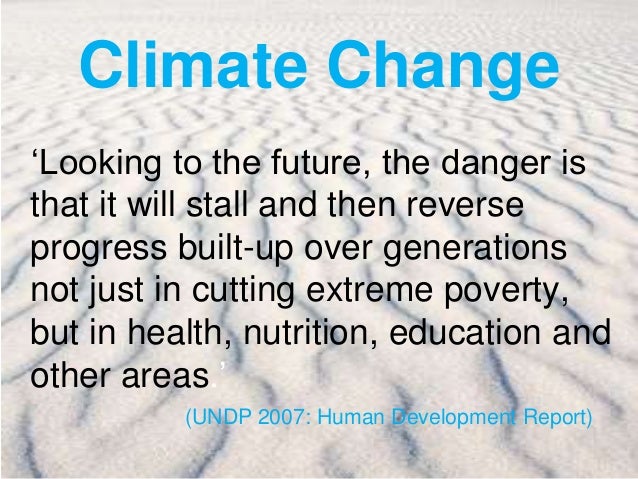"Turn Down the Heat" a World Bank Report; has warned of the grave consequences of the ongoing global warming. It has predicted that the World's poorest communities will be the most affected and adversely impacted by the effects of climate change.
It describes the impact of present day, 2°C and 4°C warming across Sub-Saharan Africa, South Asia and South East Asia.
It discusses the risks to agriculture in Sub-Saharan Africa; the rise in sea-level and devastation to coastal areas likely in South East Asia; and the fluctuating water resources in South Asia.
The expansion of the coastal cities of Africa and Asia continues to push the poorest inhabitants of these continents to the borders of habitable land and into the most risky and hazardous regions for climate change.
These informal settlements often are located around riverbanks, low-lying areas with little or no drainage facilities, few or in existent public services, and in most scenarios there is no protection from storm surges, sea-level rise, and flooding.
This report points to the fact that the a fore described communities are among the world’s most susceptible to the consequences of climate change.
Sadly, they also are almost absolutely incapable of accruing the necessary resources to aid adaptability.
The already stretched and thinning food security in sub Saharan Africa will be further severely threatened to extreme limits within the next three decades as we approach year 2050.
Life threatening extremes of weather condition have also been predicted.
According to the report, between 1.5°C-2°C warming, drought and aridity, will contribute to farmers losing 40-80 percent of cropland conducive to growing maize, millet, and sorghum by the 2030s-2040s.
Multiple studies have revealed that in a 4°C warmer world, around the 2080s, annual precipitation may decrease by up to 30 percent in southern Africa, while East Africa will see more rainfall.
Ecosystem changes to pastoral lands, such as a shift from grass to woodland savannas as levels of carbon dioxide increase, could reduce food for grazing cattle.
It describes in details the risks to agriculture and livelihood security in Sub-Saharan Africa; the rise in sea-level, loss of coral reefs and devastation to coastal areas likely in South East Asia; and the fluctuating water resources in South Asia that can lead to flooding in some areas and water scarcity in others, as well as affecting power supply.
The temperature change seems to be small, a mere 2°C and 4°C change, however the impacts will be quite tremendous and World changing.
Today, communities across the globe are already experiencing the impacts of climate change, with the planet only 0.8 ºC warmer than in the pre-industrial era.
Without appropriate concerted global action, the next two to three decades may be frothed with the devastating effects of a 2ºC warmer world and consequently a 4ºC increase by the end of the century.
In the words of The World Bank Group President Jim Yong Kim;
“The scientists tell us that if the world warms by 2°C – warming which may be reached in 20 to 30 years – that will cause widespread food shortages, unprecedented heat-waves, and more intense cyclones,"
"In the near-term, climate change, which is already unfolding, could batter the slums even more and greatly harm the lives and the hopes of individuals and families who have had little hand in raising the Earth's temperature.”
A Call to Action
The report emphasizes the need for global attention to the necessary actions needed to hold warming to 2ºC.
Rachel Kyte, the World Bank’s vice president for Sustainable Development has said that:
“Our ideas at the World Bank have already been put into practice as we move forward to assist those whose lives are particularly affected by extreme weather events.”
You and I can decide what happens to our World in the next two to three decades.
Join in the campaign today to Turn Down The Heat!

No comments:
Post a Comment